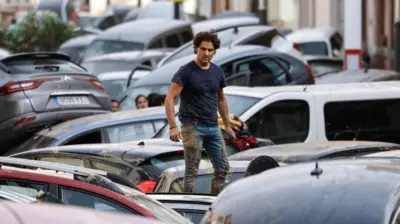We've updated our Privacy and Cookies Policy
We've made some important changes to our Privacy and Cookies Policy and we want you to know what this means for you and your data.
New council powers on bus lanes 'by end of year'
- Author, Magnus Bennett
- Role, ҙуПуҙ«ГҪ Scotland news website
New laws granting local authorities powers to enforce bus lane restrictions could be in place by the end of the year, it has emerged.
Transport Scotland has confirmed it is working on draft legislation for decriminalising bus lane offences.
It is understood the proposals could be ready to be put to the Scottish Parliament from the autumn.
The move follows a consultation process launched after approaches by Edinburgh, Glasgow and Aberdeen councils.
The councils stand to raise considerable sums from the introduction of the secondary legislation as it would mean they, rather than central government, could collect revenue raised from bus lane penalties.
Currently, fixed penalty notices for bus lane offences are handed out only by the police.
'Maximum benefit'
A Transport Scotland spokesman said: "The consultation period has now completed and work continues to progress the legislation aspect of the bus lane enforcement regulations.
"We anticipate the regulations being made by the end of the year."
Glasgow City Council has already approved in principle taking over camera enforcement in bus lanes.
It expects to raise ВЈ250,000 a year, after operating expenses, if the change is approved by parliament. The council said any money raised would be re-invested in transport-related projects.
Last year, Strathclyde Police issued 3,455 fixed penalty notices for bus lane infringements in the Glasgow area.
Jim Coleman, Glasgow City Council executive member for land and environment, said the council had invested heavily in public transport and was committed to ensuring "maximum benefit" for passengers, other road users and the city.
He added: "To do that, we have to ensure the valuable facilities we have provided are able to be used efficiently and for many years now have sought powers to deal with bus lane enforcement which is, perhaps understandably, not a policing priority.
"Civil enforcement will allow the city to better respond to the problems created by the abuse of lanes by the minority of drivers who inconvenience thousands of travellers and threaten safety."
'Enhanced efficiency'
Aberdeen City Council said it welcomed the news that substantial progress was now being made in finalising the necessary secondary legislation governing the civil enforcement of bus lanes.
A spokesman said: "We have been pressing the Scottish government and Transport Scotland for several years to complete the paperwork and hope that Scottish parliamentary scrutiny of the draft legislation towards the end of this year throws up no last-minute snags.
"Decriminalisation will allow the city council to take over enforcement from the police and exert tighter controls on misuse of the bus lanes."
He added: "The city council has made a substantial investment in the bus lane network to help deliver reliable public transport.
"Stricter enforcement will enhance the efficiency of the bus lanes by reducing delays to buses and improving bus journey reliability."
Earlier this year, Edinburgh City Council launched a tender for five portable cameras in the expectation of legislative changes.
The authority said the cameras would allow the city to enforce "known problem sites" more efficiently while freeing up police resources.
It expects to break even on the expected initial ВЈ293,000 capital cost of the cameras within a few years.
Top Stories
More to explore
Most read
Content is not available








